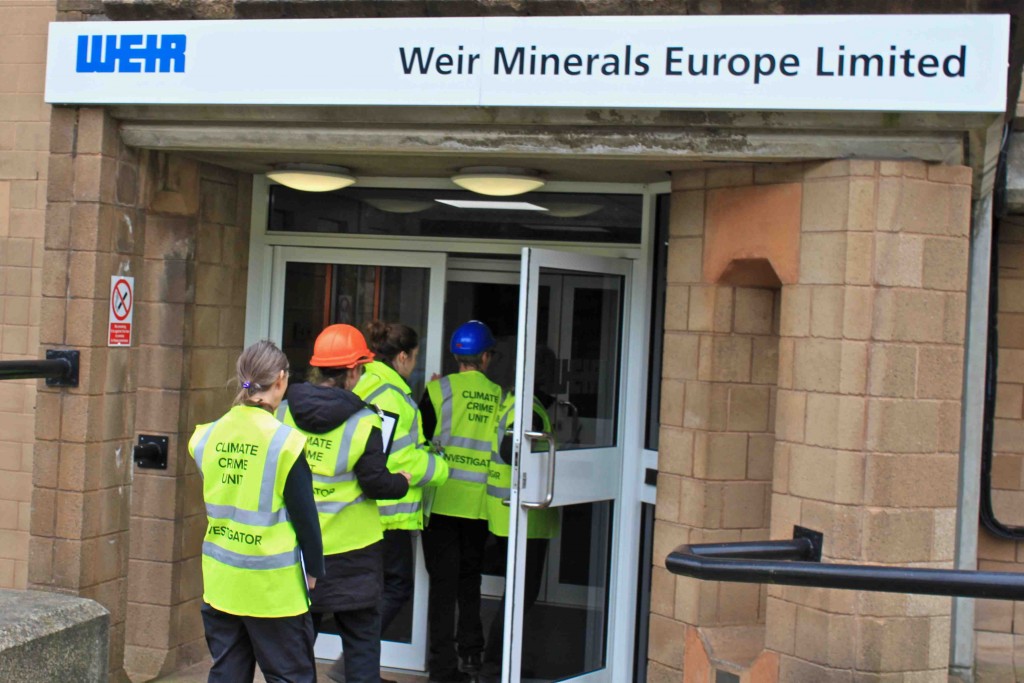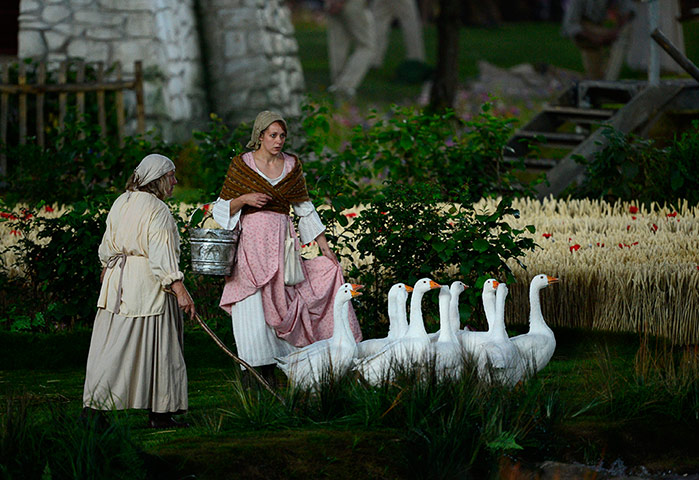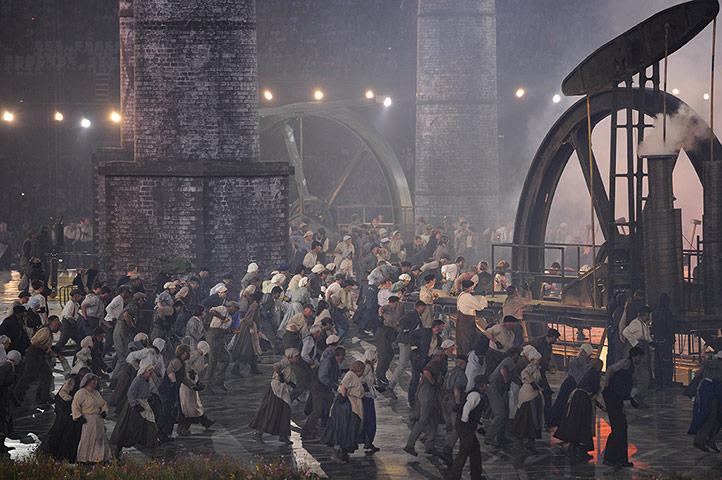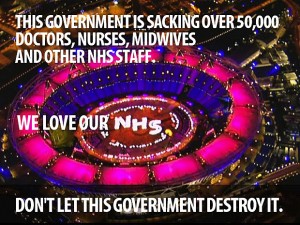 Following an unannounced visit by Climate Crime Unit Investigators on April 6th, the managing director of Weir Minerals in Todmorden has agreed to ask Weir Head Office whether the company warns shareholders of the risk attached to the Weir’s substantial investments in the fossil fuel industry, and if they have any plans for divesting from fossil fuels. Continue reading
Following an unannounced visit by Climate Crime Unit Investigators on April 6th, the managing director of Weir Minerals in Todmorden has agreed to ask Weir Head Office whether the company warns shareholders of the risk attached to the Weir’s substantial investments in the fossil fuel industry, and if they have any plans for divesting from fossil fuels. Continue reading
Tag Archives: climate change
Arctic permafrost thaws releasing less carbon dioxide than expected
Tim Radford, writing for Climate News Network, reports that scientists are mulling Arctic’s slow CO2 loss.
The Arctic permafrost thaws each year, but – to the surprise of scientists from Denmark – in some areas it is not releasing the carbon dioxide it contains nearly as fast as they had expected.
Continue reading
Worse floods ahead as climate warms
Paul Brown of Climate News Network reports on a new study of “atmospheric rivers” – bands of enhanced water vapour in the earth’s atmosphere. The study shows they are becoming bigger and holding more water vapour as the earth’s atmosphere warms.
“Atmospheric rivers”, airborne corridors of concentrated moisture which carry huge volumes of water, are set to get wider and longer, causing more frequent and catastrophic floods as the atmosphere warms.
Continue reading
Study finds low risk that arctic tundra melt methane will add to global warming
If the science is right, here’s some good news on the climate change front. A downloadable open source scientific paper concludes that permafrost melting in arctic places will not increase methane (CH4) emissions enough to add to further global warming.
Continue reading
It costs less to tackle climate change than to do nothing
There is a conventional view that global action to reduce climate change is a cost to society. But a 2012 Report, Guide to a Cold Calculus for a Hot Planet, outlines how tackling climate change through coordinated efforts between nations would produce much-needed benefits for all, and cost less than sticking with business as usual in the global carbon-intensive economy.
Northern hemisphere food security at risk from climate change, warns leading scientist
A leading British climate scientist has warned that the further warming to which the world is already unavoidably committed will cause problems for farmers.
The scientist is Martin Parry, visiting professor at the Centre for Environmental Policy, Imperial College London, visiting research fellow at Imperial’s Grantham Institute for Climate Change and a former co-chair of Working Group II (Impacts, Adaptation and Vulnerability) of the Intergovernmental Panel on Climate Change, the IPCC.
Continue reading
Stop earth hotting up, or permafrost will thaw
Aside
This video from Yale Climate Forum explains that we are half way to the threshold temperature at which arctic permafrost will thaw and release huge quantities of carbon dioxide and methane into the earth’s atmosphere, triggering uncontrollable climate change.
Recent research from Oxford University indicates arctic permafrost thawing will occur if the earth’s temperature increases to 1.5ºC above the pre-industrial temperature of the earth.
We are now 0.8ºC hotter than in pre-industrial times, so it’s vital that we reduce human-caused carbon emissions quickly and steeply, in order to have a chance of stopping the rise in the earth’s temperature before it reaches 1.5ºC above the pre-industrial level.
Large-scale biomass burning is not carbon neutral and will worsen climate change
The Leeds City Region Green Economy Panel is promoting large-scale biomass electricity generation at the Drax power station near Leeds.
Like many members of the public, the Green Economy Panel members probably assume that burning wood and other biomass is carbon neutral. In other words – that burning wood and other biomass doesn’t add to carbon dioxide in the atmosphere, because new forest growth will absorb and store the carbon emissions released when the wood is burned. This isn’t the case – the European Environment Agency calls the assumption “ a serious accounting error”.
Continue reading
The power of social media
Aside
Enough to “make Nick Clegg throw his toys out of the pram.” Chris Heaton-Harris MP says 30,000 social media activist members of 38 Degrees helped force Clegg to stand strong on climate targets.
Olympic pageant mashup
Through the traditional medium of the pageant, 10,000 volunteers directed by filmmaker Danny Boyle performed a live action mashup or montage to portray who we are and how we got here. The pageant moved from medieval village life, through the industrial revolution, to a celebration of the NHS, children, comedy and popular culture.
Montage
Throwing different images together creates new meanings from their collision – this is the principle of montage, a film editing technique developed by early filmmakers like Sergei Eisenstein in silent movie classics like Potemkin, October and Strike. It also underpins the work of the Surrealists, who famously defined beauty as the chance meeting of an umbrella and a sewing machine on a dissection table. I guess it took a filmmaker to apply what’s basically a film editing technique to a gigantic live-action pageant.
So what new meanings did this Olympic juxtaposition of images spark? There will be as many answers to that as there are people who saw the pageant.
A new idea – a National Environmental Service
For me, the pageant provoked the idea that what we need now is a National Environmental Service.
Just as the NHS was a creative, collective response to long-standing social injustices in a previous time of economic and social chaos – following the 1930s depression and the death and destruction of World War 2, so we need a collective, creative response to our current chaos – which this time includes environmental as well as social injustice. The NHS – which the Olympic pageant showed as a defining, much-loved feature of British life and society – provides us with a model of how to pull ourselves out of the mess we’re in, by creating social institutions based on truly collective principles.
Surveys show that most people in the UK
- recognise that human-influenced climate change is happening and is damaging the environment and people’s lives
- would support equitable laws and regulations to reduce climate change and adapt to it
Current climate change policies are based on the idea that human-influenced climate change is a problem caused by market failure. They therefore advocate financial and market-based measures to solve the problem. This view underpins the Stern Review, which has formed the basis for the Climate Change Act 2008. This Act basically shapes all national and local government policies and programmes to deal with climate change.
As a response to a massive, collective problem, treating climate change as if it’s a market failure is as if Aneurin Bevan’s health service reforms had said that tinkering with the private health care system would solve the problem that millions of people couldn’t afford health care.
Collective, creative political reforms
Climate change is a political problem, not the result of market failure. It’s the result of historical decisions about the kind of economy and society we’ve developed – one that, as the Olympic pageant showed, has been based on industrial-scale use of fossil fuels.
It’s also what planners call a wicked problem – a problem that’s so pervasive and complicated that no single “silver bullet” solution is available. There are only a variety of clumsy solutions to wicked problems. In other words, solutions that work more or less well for different bits of the problem.
Climate change is also a social justice problem. The richest individuals and the biggest and most powerful companies cause the greatest amount of climate-changing greenhouse gas emissions. The poorest produce the lowest amount of emissions, but suffer most of the consequences of environmental degradation and climate change.
For all these reasons, climate change is a collective, political problem. That means we need a collective, creative, political solution. Inspired by the value and durability of the NHS, let’s imagine how to extend the Olympic pageant into the future, taking with us the skills, knowhow, creativity, sense of fun and commitment to collective, socially just reforms that’ve brought us here so far, and extending them to repair and make good the unforeseen problem of human-influenced climate change that our very successes have generated.
Now, you may think this is nuts. But read what the pageant’s writer, Frank Cottrell Boyce, has to say.






